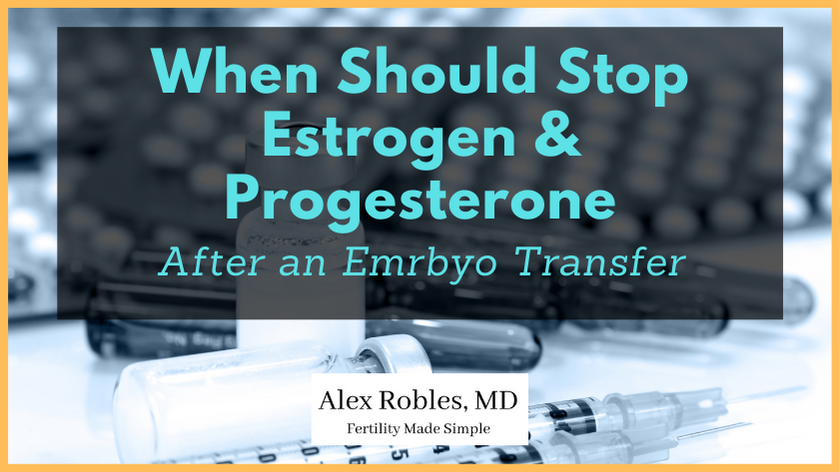Why do you take estrogen after an embryo transfer?
When can you stop taking it?
What about progesterone?
In this post, you will learn everything you need to know regarding estrogen and progesterone after an in vitro fertilization cycle.
Let’s get started.

When do you stop taking estrogen after FET / IVF?
You can safely discontinue the use of any estrogen between your 8th-10th week of pregnancy.
This means that you will take the medication leading up to your embryo transfer, on the day of your embryo transfer, and for a few weeks after confirmation of pregnancy.
Taking your medications is especially important during the first two weeks after the transfer while you await the results of your pregnancy tests.
If your embryo transfer did not work, your doctor would likely have you discontinue your medications right away.
Why do you take estrogen after IVF?
Estrogen is required for the growth of your uterine lining and the maintenance of its thickness.
Estrogen is also thought to help sustain an early pregnancy. Estrogen levels steadily rise during a natural cycle and continue to increase in the early weeks after conception.
The early pregnancy will begin making and secreting estrogen within a few days of embryo implantation. However, the levels are not high. This is where estrogen supplementation comes in.
Estrogen will supplement those levels and allow your endometrial lining to continue growing while helping sustain the early stages of pregnancy.
What happens if I miss an estradiol dose?
Missing a dose of estrogen is common before and after embryo transfers. If you miss a dose, you can probably take it as soon as you remember or pick up where you left off. Speak with your healthcare provider for more guidance.
In most cases, you can continue with your regular dosing schedule unless otherwise instructed by your doctor.
As long as you miss no more than 1-2 doses, your endometrial lining will probably not be affected.
What is a good estrogen level for implantation?
In a natural menstrual cycle, serum estrogen levels reach 200-300 pg/mL just before ovulation.
In a typical IVF cycle, estrogen levels exceed this range and are often in the thousands.
Therefore, it is reasonable to conclude that a serum estradiol level of ~200 is sufficient for implantation.
How much estradiol can I take after IVF?
The usual dose of estradiol is a 2mg tablet twice or thrice a day. The tablet can be taken orally or as vaginal suppositories.
To ensure that it is working, you will have your hormone levels, as well as your endometrial lining, checked throughout the embryo transfer cycle.
However, as important as estrogen is, more isn’t better.
What happens if you take too much estradiol?
There is some data to show that very high estradiol levels may inhibit implantation.
One retrospective study saw that patients who had an unsuccessful embryo transfer had on average much higher estradiol levels compared to those who had successful implantation. 4,228 pg/mL in the unsuccessful group compared to 2,892 pg/mL in the successful group.
More research is needed to clarify further how much estrogen is too much.
In addition, taking high doses of estrogen is associated with increased side effects.
What are the side effects of estrogen?
Side effects of estrogen include:
- Nausea
- Breast tenderness
- Bloating/ Abdominal distension
- Headaches
- Vaginal itching / irritation
- High Blood pressure
If you experience any bothersome side effects, your doctor can decrease your dose or change the route of administration.
Okay, now let’s shift to progesterone.
When is it safe to stop progesterone after an IVF embryo transfer?
Progesterone should be taken continuously until a normal pregnancy is confirmed at the very least.
Progesterone is normally made by the corpus luteum, which is the cyst the remains after the egg has been released.
The corpus luteum will continue to produce progesterone until it is no longer needed, which is around ~8-9 weeks of pregnancy. At this point, the placenta takes over the function of progesterone production. This is a process known as the luteal placental shift.
With that said, the optimal duration of progesterone supplementation is unclear.
A few studies demonstrate no significant risks if progesterone is discontinued at ~5 weeks gestation or around the time of a positive pregnancy test in fresh embryo transfers. [1] [2]
It is important to note that patients who undergo fresh transfers have high levels of natural endogenous progesterone after an IVF cycle.
Do not discontinue estrogen or progesterone until your doctor has confirmed that you no longer need it.
What happens when you stop taking progesterone after IVF?
If you discontinue your progesterone too early, there is a theoretically increased risk of miscarriage.
Ideally, your serum progesterone levels should exceed 10 ng/mL on the blood test taken at the time as your pregnancy test.
If your progesterone levels are borderline, it is essential to continue progesterone supplementation for luteal phase support until the placenta can take over production.
This is especially true if you had a medicated frozen embryo transfer cycle in which you do not have a corpus luteum.
Is there a significant difference between intramuscular progesterone or vaginal progesterone?
Traditionally, the type of progesterone used depends on which type of frozen embryo transfer (FET) protocol you are using.
If you are doing a natural FET cycle, you will grow a follicle, ovulate, and have a corpus luteum to produce your progesterone.
If you are doing a medicated FET cycle, no follicle grows. Therefore, you will not have no endogenous source of progesterone.
Vaginal progesterone is preferred for natural cycles, as it is simply a supplement to what your body is already producing.
While vaginal is associated with fewer side effects, progesterone should be given as an intramuscular injection if you have a medicated cycle.
A recent study further validated that intramuscular progesterone is superior to vaginal progesterone in terms of decreasing the risk of miscarriage in medicated FET cycles. However, they also saw that a combination of vaginal mixed with intramuscular (IM) progesterone was equivalent to IM progesterone alone.
Other Related Questions
What is a typical estrogen level at trigger in an IVF cycle?
Estrogen levels on the day of trigger can range from 200 pg/mL to 4000+ pg/mL. The higher the estrogen level, the higher the risk of OHSS, or ovarian hyperstimulation syndrome.
How long after IVF do hormones last?
After an IVF cycle, estrogen levels return to normal within 10-14 days, which is when you will get a period.
If you get pregnant, all hormones are discontinued by ~10 weeks gestation. After this time, your pregnancy will produce all of the necessary hormones to maintain itself.
What other medications are typically used in IVF?
An IVF cycle requires the use of several medications. The following is a list of common medications used in IVF:
- FSH (Follistim, Gonal-F)
- LH (Menopur)
- Ganirelix Acetate or Cetrotide (GnRh antagonist)
- Leuprolide Acetate – GnRH agonist (trigger shot or downregulation)
- HCG (trigger shot)
I discuss these medications as well as their side effects in more detail in this post.
Final Words On How long To I have to take Estrace after IVF Treatment
Most reproductive endocrinologists will have you continue your estrogen and progesterone until after a normal pregnancy is confirmed.
If your progesterone levels are borderline, you will need to continue supplementation until the placenta is able to produce adequate amounts of this hormone.
With that said, every case is unique. Be sure to speak with your doctor to learn what you can do to improve your pregnancy rate, ongoing pregnancy rate, and live birth rate!
Related Articles:
- The Egg Retrieval Day: What To Expect
- What Not To Do On The Day Of Embryo Transfer
- The IVF Process Timeline: How Long Does It All Take?
Make An Appointment With Dr. Robles To Discuss Your Fertility Options Today!

Alex Robles, MD
Dr. Alex Robles is a Spanish-speaking Latino-American Reproductive Endocrinologist and Infertility specialist in New York City, and a board-certified OBGYN. He has a special interest in health, lifestyle, & nutrition. Make an appointment with Dr. Robles to discuss your fertility options today!
References:
- Werlin, L. B., E. C. Marello, and T. E. Nass. “Is there an ideal estradiol (E2) above which implantation is less likely to occur?.” Fertility and Sterility 96.3 (2011): S181-S182.
- Chang, Ko-Tung, et al. “High levels estradiol affect blastocyst implantation and post-implantation development directly in mice.” Biomedical Journal (2021).
- Liu XR, Mu HQ, Shi Q, Xiao XQ, Qi HB. The optimal duration of progesterone supplementation in pregnant women after IVF/ICSI: a meta-analysis. Reprod Biol Endocrinol. 2012;10:107. Published 2012 Dec 13. doi:10.1186/1477-7827-10-107
- Pan SP, Chao KH, Huang CC, Wu MY, Chen MJ, Chang CH, Yang JH, Yang YS, Chen SU. Early stop of progesterone supplementation after confirmation of pregnancy in IVF/ICSI fresh embryo transfer cycles of poor responders does not affect pregnancy outcome. PLoS One. 2018 Aug 9;13(8):e0201824. doi: 10.1371/journal.pone.0201824. PMID: 30092070; PMCID: PMC6084928.
- Devine, Kate, et al. “Intramuscular progesterone optimizes live birth from programmed frozen embryo transfer: a randomized clinical trial.” Fertility and Sterility (2021).
